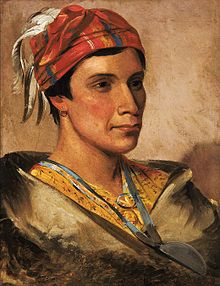Daniel Bread
| Daniel Bread | |
|---|---|
| Tekaya-tilu, Tega-wir-tiron ("Learning Body") | |

Daniel Bread, Chief of the Oneida, 1831
|
|
| Oneida leader | |
| Personal details | |
| Born | March 27, 1800 Oneida Castle, New York |
| Died | July 23, 1873 |
| Cause of death | Bilious fever |
| Political party | First Christian |
| Known for | principal chief of the Oneida people |
| Religion | Episcopalian |
Daniel Bread (1800-1873) was an important Oneida political and cultural leader who helped the Oneida preserve their culture while adapting to new realities during their transplantation from New York to Wisconsin (known then as Michigan Territory). He was frequently described as a "principal chief", "head chief", or "sachem" by the Oneida but held no hereditary position and was not an officially condoled chief. Bread was a pragmatist who found ways to compromise between "promoting tribal sovereignty and treaty rights" and cooperating with federal and state officials. He played a major role in adapting the Iroquois Condolence Council ritual into a July 4 celebration that recognized the alliance of the Oneida with George Washington during the American Revolution. At age 14, Bread was part of the defense of Sackets Harbor during the Battle of Big Sandy Creek.
Daniel Bread was the son of Dinah Bread and an Oneida named Williams; however his biological father died. He was renamed after his stepfather, Daniel Bread. He had at least one sister.
Little is known about Daniel Bread's early life, but historian Laurence Hauptman reports he spent time in the Oneida reservation's Presbyterian mission school founded by Samuel Kirkland, learning to read and write English, arithmetic, and the Christian catechism. Bread also likely learned a great deal from tales told by Oneida council leaders. He would also have had the opportunity to observe the spokesman for the First Christian party, Skenandoa, lose influence among the Oneida by signing away many of the Oneida lands over to the state in the 1780s and 1790s. Bread's tribe was subject to yellow fever, tuberculosis, and alcohol-related problems during his youth.
A Canadian clergyman of Mohawk descent, Eleazer Williams, became an Episcopalian missionary to the Oneida in 1817. Williams proposed that the Iroquois move from New York to Michigan Territory, and led delegations to Green Bay to negotiate treaties with the Menominee and Ho-Chunk (Winnebago) tribes that secured land along Duck Creek, Wisconsin and in the Fox River Valley at Little Chute. It was in this context that Daniel Bread worked to find consensus among a highly divided Oneida community and prevent the Oneidas from being moved again. Historians Laurence Hauptman and Gordon McLester credit him with being "the Indian most responsible for the overall administration of the move to Michigan Territory".
...
Wikipedia
